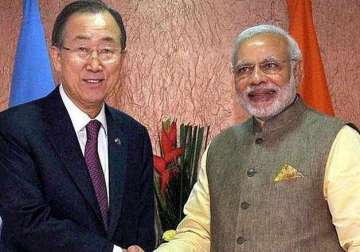Need to send tough message against terrorism: Modi to United Nations
United Nations : The historic 70th year of the UN must be used to send an "unambiguous message" of "zero tolerance against terrorism", Prime Minister Narendra Modi has said, citing the threats posed by "non-state

United Nations : The historic 70th year of the UN must be used to send an "unambiguous message" of "zero tolerance against terrorism", Prime Minister Narendra Modi has said, citing the threats posed by "non-state military actors", in a letter to UN chief Ban Ki-moon.
"The United Nations must be made more effective for dealing with the new security challenges. The United Nations was born out of the ashes of the Second World War when conflict was an inter-state phenomenon.
"However, we are now living in an era when non-state military actors are a major factor," Modi said in a veiled reference to threats posed to India from Pakistan.
He also called for the adoption of a comprehensive convention against international terrorism this year.
The letter dated July 4 was made available by India's Permanent Mission to the UN during a press briefing here yesterday.
Also Read: Tata Mutual Fund plans scheme on 'Make in India', 'Digital India' drive
Modi arrives at the world body's headquarters in about a week to address the high-level Sustainable Development Summit on September 25.
In the letter, Modi said terrorism and violent, intolerant extremism did not exist earlier as a primary threat to nations and societies at large.
"Indeed, with expanded geographical spread, vast resources and new instruments to spread its ideology and draw recruits, the menace of terrorism and extremism has acquired a new dimension that requires a comprehensive global strategy.
"We must use this historic year to jointly send an unambiguous message of zero tolerance against terrorism.
"An important step in this direction would be adopting the Comprehensive Convention against International Terrorism at the United Nations this year," the Indian leader writes in the letter.
Modi said for 70 years the world has remained a "better place" because of the UN but the world has changed dramatically since 1945.
"Threats to peace and security have become more complex, unpredictable and undefined. In many ways, our lives are becoming globalised, but fault-lines around our identities are growing," he said.
Modi underscores that his purpose in writing the letter to the UN Chief is to "remind ourselves that we need to seize this moment to rethink how the multilateral system can be made more inclusive, more effective and, ultimately, better fit for the purpose it was conceived."
Also Read: PM Modi government only doing lip-service for farmers, alleges Subodh Kant Sahay
The 70th anniversary year of the world body is a landmark when member states should ask if the United Nations is adequately equipped to deal with the times they live in.
"Drawing lessons from the past, including policy failures, and keeping in view today's global priorities, we must challenge our existing thinking on each of the three fundamental pillars of the United Nations -- peace and security, human rights and development," Modi said.
On peacekeeping operations, Modi said that there is need to examine if the traditional peacekeeping missions of the United Nations are adequately equipped to deal with the new international security environment and the evolving nature of conflicts, especially at a time of continuing resource constraints and the consequent demands placed on the existing machinery.
"We need to review the approach and systems of the UN in this regard. Our exercise will be more productive if we involve the troop contributing countries and give them a greater say in formulating mandates and ensuring that the missions have adequate resources.
"In the long run, peace can only be sustained through an inclusive political dialogue to bring about the peaceful resolution of disputes," Modi said in the letter.
India is the single largest contributor to UN peacekeep and so far 180,000 Indian troops have participated in 44 of the 69 operations mandated by the Security Council.